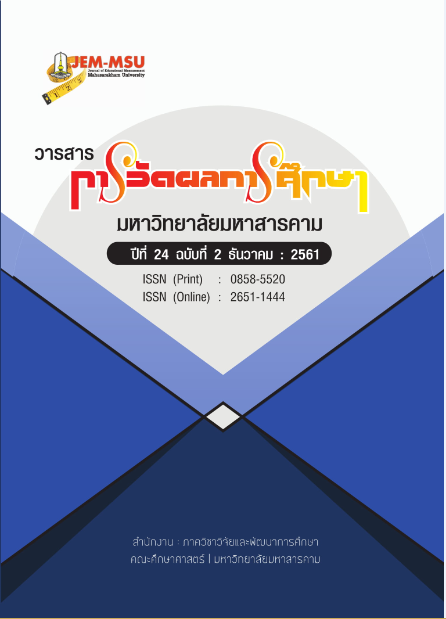The Effects of the Growth Mindset Program in Upper Secondary School Students
Main Article Content
Abstract
The purpose of this study was to study the effects of the growth mindset program in upper secondary school students. The sample comprised 70 students of Banchangkarnchanakulwittaya School, Rayong, in the academic year 2017, obtained through random assignment and matching into two groups. Thirty-five students were assigned into the experimental group, and another 35 into the control group. The research instruments were the growth mindset program and a mindset assessment scale. Two comparisons were made. The first was comparing the growth mindset score of the experimental group with the control group after the experiment; and compare the growth mindset score after the experiment with the score before the experiment, employing t-test.
The research findings were summarized as follows:
- The students in the experimental group demonstrated higher growth mindset score in the post-test than the pre-test, with statistical significance at the .05 level.
- The students in the experimental group demonstrated higher growth mindset score in post-test than the control group, with statistical significance at the .05 level.
The results indicated that the growth mindset program could develop growth mindset of students better, and the growth mindset of the students in the experimental group is better than those in the control group.
Article Details
The content and information contained in the published article in the Journal of Educational Measurement Mahasarakham University represent the opinions and responsibilities of the authors directly. The editorial board of the journal is not necessarily in agreement with or responsible for any of the content.
The articles, data, content, images, etc. that have been published in the Journal of Educational Measurement Mahasarakham University are copyrighted by the journal. If any individual or organization wishes to reproduce or perform any actions involving the entirety or any part of the content, they must obtain written permission from the Journal of Educational Measurement Mahasarakham University.
References
(Strategies for Brain-Based Learning). ชลบุรี: คณะศึกษาศาสตร์ ภาควิชาวิจัยและจิตวิทยา
ประยุกต์.
ชัชวาลย์ ศิลปกิจ,อรวรรณ ศิลปกิจ และ รสสุคนธ์ ชมชื่น. (2558). ความตรงของแบบวัดชุดความคิด.
วารสารสุขภาพจิตแห่งประเทศไทย, 23(3).
Blackwell, L. A., Trzesniewski, K. H., & Dweck, C. S. (2007). Theories of intelligence and
achievement across the junior high school transition: A longitudinal study and an
intervention. Child Development, 78(1), 246-263.
Caine, R. N., & Caine, G. (2005). 12 brain/ mind learning principles in action: The field book
for making connections, teaching, and the human brain. Thousand Oaks, CA:
Corwin Press.
Caine, R. N. & Caine, G. Carol, M., & Karl, K. (2009). Brain/ mind learning Principles in
action:Developing executive function brain of human. 2 nd ed. CA: Corwin Press.
Dweck, C. S. (2006). Mindset: The new psychology of success. New York: Random House.
__________. (2007). Boosting achievement with messages that motivate. Education Canada.
__________. (2012). Mindset: How you can fulfill your potential. Constable & Robinson
Limited.
Muller, C. M., & Dweck, C. S. (1998). Praise for intelligence can undermine children’s
motivation and performance. Journal of Personality and Social Psychology, 75(1),
33-52.
O'Rourke, E., Haimovitz, K., Ballweber, C., Dweck, C. S., & Popovic, Z. (2014). Brain points:
A growth mindset incentive structure boosts persistence in an educational game.
Proceedings of the SIGCHI Conference on Human Factors in Computing Systems.


